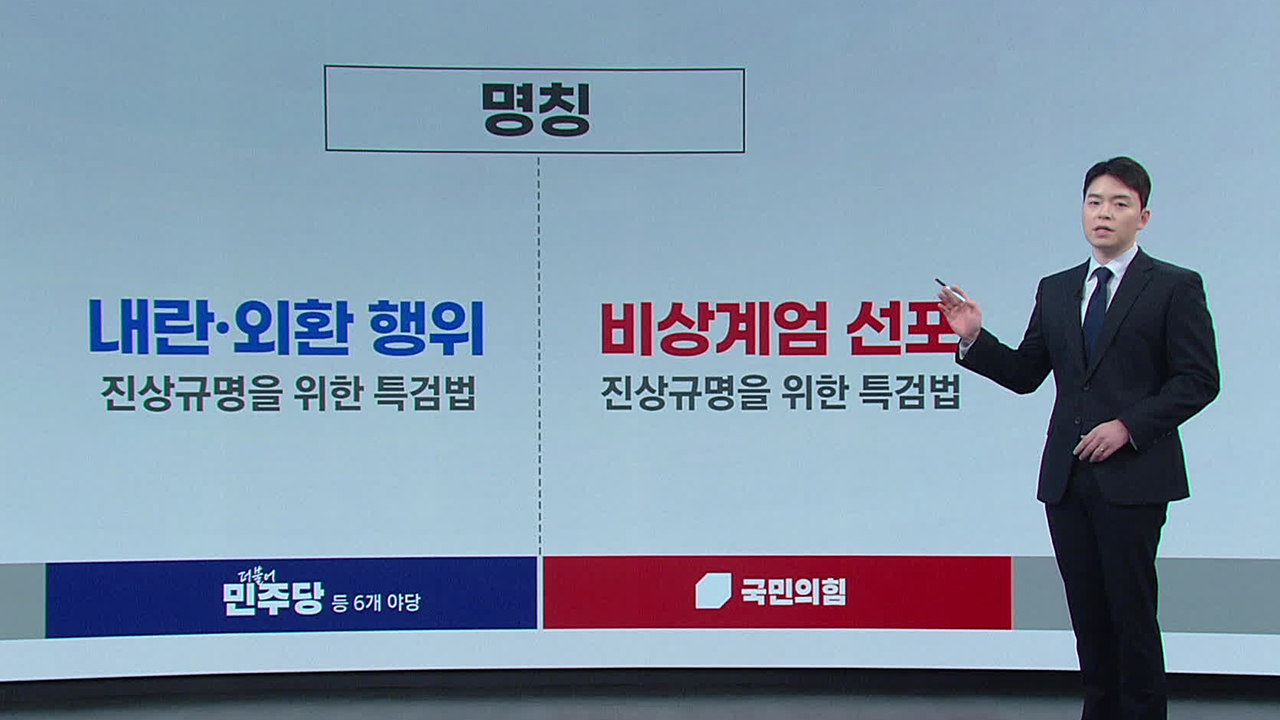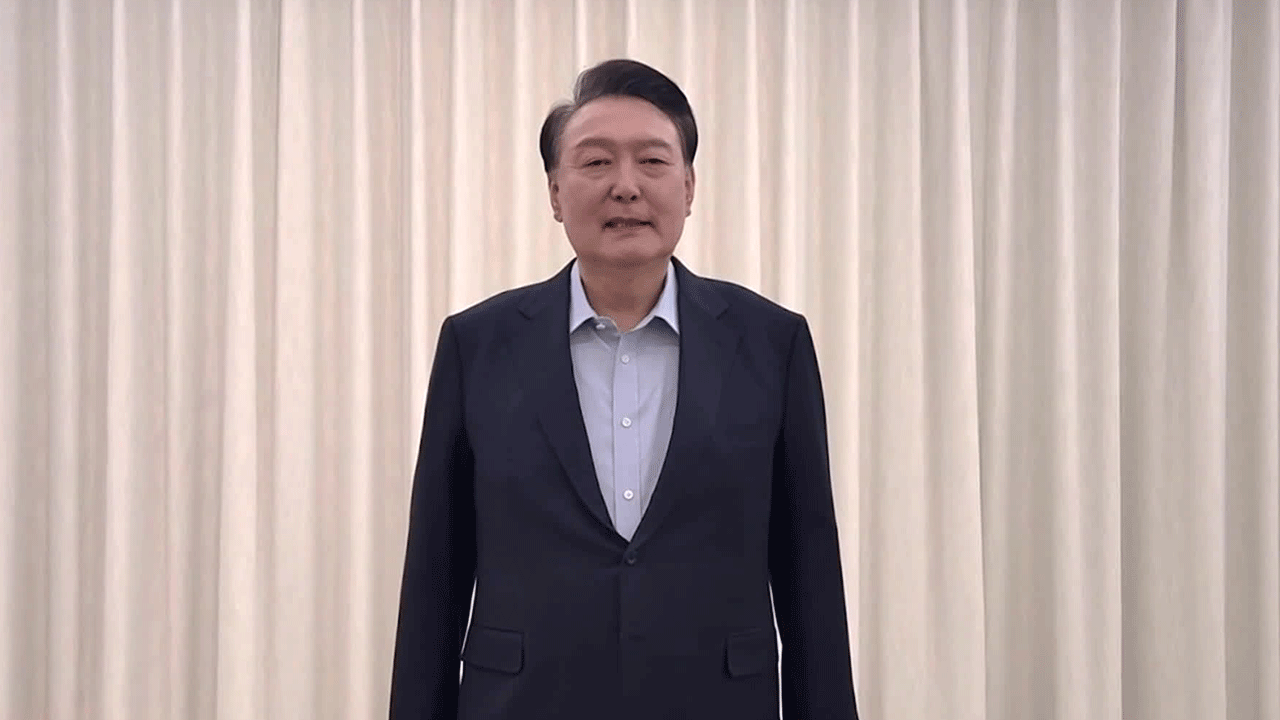Keys to special Investigation bills
입력 2025.01.15 (00:07)
읽어주기 기능은 크롬기반의
브라우저에서만 사용하실 수 있습니다.
[Anchor]
Now, let's take a look at the differences between the special investigation bill on emergency martial law proposed by the ruling party and the special investigation law on insurrection and foreign aggression inducement charges already proposed by the opposition party.
Reporter Lee Yoon-woo will explain it clearly.
[Report]
The special investigation bills presented by both parties have different names from the start.
The opposition's bill is titled "Special Investigation Law for the Truth of Insurrection and Foreign Aggression Inducement Acts," which includes insurrection and foreign aggression inducement allegations, while the ruling party's bill states that it cannot yet confirm insurrection charges and is titled "Special Investigation Law for the Truth of Emergency Martial Law."
The key issue is the scope of the investigation.
The opposition's bill includes 11 items related to the martial law situation, government foreign aggression inducement activities related to North Korea policies such as loudspeakers, insurrection propaganda and incitement, and related complaints and accusations.
The ruling party's bill narrowed this down to 5 items by removing foreign aggression indecement, insurrection propaganda and incitement, and complaints and accusations.
The scope of search and seizure also differs; the opposition's bill allows searches of military confidential locations, while the ruling party's bill removed this provision citing national security.
The opposition's bill allows for media briefings on the investigation process except for the facts of the case, but the ruling party's bill omitted this due to concerns about the disclosure of facts related to the accused.
As the scope of the investigation has been narrowed, the investigation period has also been reduced from a maximum of 150 days to 110 days, and the number of investigators has been cut from 155 to 68.
The method for recommending special investigation candidates, which the Democratic Party has significantly conceded on, is also different.
The opposition's bill stipulates that the Chief Justice of the Supreme Court should make the recommendation, while the ruling party's bill presents two additional options: one by the Minister of the National Court Administration and another by the president of the Korean Law Professors Association.
Notably, the ruling party's bill includes a provision that "indictments by the special investigation team that exceed their scope of duty shall have no effect," which is not present in the opposition's bill, aiming to limit excessive investigations by the special investigation team.
This is KBS News, Lee Yoon-woo.
Now, let's take a look at the differences between the special investigation bill on emergency martial law proposed by the ruling party and the special investigation law on insurrection and foreign aggression inducement charges already proposed by the opposition party.
Reporter Lee Yoon-woo will explain it clearly.
[Report]
The special investigation bills presented by both parties have different names from the start.
The opposition's bill is titled "Special Investigation Law for the Truth of Insurrection and Foreign Aggression Inducement Acts," which includes insurrection and foreign aggression inducement allegations, while the ruling party's bill states that it cannot yet confirm insurrection charges and is titled "Special Investigation Law for the Truth of Emergency Martial Law."
The key issue is the scope of the investigation.
The opposition's bill includes 11 items related to the martial law situation, government foreign aggression inducement activities related to North Korea policies such as loudspeakers, insurrection propaganda and incitement, and related complaints and accusations.
The ruling party's bill narrowed this down to 5 items by removing foreign aggression indecement, insurrection propaganda and incitement, and complaints and accusations.
The scope of search and seizure also differs; the opposition's bill allows searches of military confidential locations, while the ruling party's bill removed this provision citing national security.
The opposition's bill allows for media briefings on the investigation process except for the facts of the case, but the ruling party's bill omitted this due to concerns about the disclosure of facts related to the accused.
As the scope of the investigation has been narrowed, the investigation period has also been reduced from a maximum of 150 days to 110 days, and the number of investigators has been cut from 155 to 68.
The method for recommending special investigation candidates, which the Democratic Party has significantly conceded on, is also different.
The opposition's bill stipulates that the Chief Justice of the Supreme Court should make the recommendation, while the ruling party's bill presents two additional options: one by the Minister of the National Court Administration and another by the president of the Korean Law Professors Association.
Notably, the ruling party's bill includes a provision that "indictments by the special investigation team that exceed their scope of duty shall have no effect," which is not present in the opposition's bill, aiming to limit excessive investigations by the special investigation team.
This is KBS News, Lee Yoon-woo.
■ 제보하기
▷ 카카오톡 : 'KBS제보' 검색, 채널 추가
▷ 전화 : 02-781-1234, 4444
▷ 이메일 : kbs1234@kbs.co.kr
▷ 유튜브, 네이버, 카카오에서도 KBS뉴스를 구독해주세요!
- Keys to special Investigation bills
-
- 입력 2025-01-15 00:07:27

[Anchor]
Now, let's take a look at the differences between the special investigation bill on emergency martial law proposed by the ruling party and the special investigation law on insurrection and foreign aggression inducement charges already proposed by the opposition party.
Reporter Lee Yoon-woo will explain it clearly.
[Report]
The special investigation bills presented by both parties have different names from the start.
The opposition's bill is titled "Special Investigation Law for the Truth of Insurrection and Foreign Aggression Inducement Acts," which includes insurrection and foreign aggression inducement allegations, while the ruling party's bill states that it cannot yet confirm insurrection charges and is titled "Special Investigation Law for the Truth of Emergency Martial Law."
The key issue is the scope of the investigation.
The opposition's bill includes 11 items related to the martial law situation, government foreign aggression inducement activities related to North Korea policies such as loudspeakers, insurrection propaganda and incitement, and related complaints and accusations.
The ruling party's bill narrowed this down to 5 items by removing foreign aggression indecement, insurrection propaganda and incitement, and complaints and accusations.
The scope of search and seizure also differs; the opposition's bill allows searches of military confidential locations, while the ruling party's bill removed this provision citing national security.
The opposition's bill allows for media briefings on the investigation process except for the facts of the case, but the ruling party's bill omitted this due to concerns about the disclosure of facts related to the accused.
As the scope of the investigation has been narrowed, the investigation period has also been reduced from a maximum of 150 days to 110 days, and the number of investigators has been cut from 155 to 68.
The method for recommending special investigation candidates, which the Democratic Party has significantly conceded on, is also different.
The opposition's bill stipulates that the Chief Justice of the Supreme Court should make the recommendation, while the ruling party's bill presents two additional options: one by the Minister of the National Court Administration and another by the president of the Korean Law Professors Association.
Notably, the ruling party's bill includes a provision that "indictments by the special investigation team that exceed their scope of duty shall have no effect," which is not present in the opposition's bill, aiming to limit excessive investigations by the special investigation team.
This is KBS News, Lee Yoon-woo.
Now, let's take a look at the differences between the special investigation bill on emergency martial law proposed by the ruling party and the special investigation law on insurrection and foreign aggression inducement charges already proposed by the opposition party.
Reporter Lee Yoon-woo will explain it clearly.
[Report]
The special investigation bills presented by both parties have different names from the start.
The opposition's bill is titled "Special Investigation Law for the Truth of Insurrection and Foreign Aggression Inducement Acts," which includes insurrection and foreign aggression inducement allegations, while the ruling party's bill states that it cannot yet confirm insurrection charges and is titled "Special Investigation Law for the Truth of Emergency Martial Law."
The key issue is the scope of the investigation.
The opposition's bill includes 11 items related to the martial law situation, government foreign aggression inducement activities related to North Korea policies such as loudspeakers, insurrection propaganda and incitement, and related complaints and accusations.
The ruling party's bill narrowed this down to 5 items by removing foreign aggression indecement, insurrection propaganda and incitement, and complaints and accusations.
The scope of search and seizure also differs; the opposition's bill allows searches of military confidential locations, while the ruling party's bill removed this provision citing national security.
The opposition's bill allows for media briefings on the investigation process except for the facts of the case, but the ruling party's bill omitted this due to concerns about the disclosure of facts related to the accused.
As the scope of the investigation has been narrowed, the investigation period has also been reduced from a maximum of 150 days to 110 days, and the number of investigators has been cut from 155 to 68.
The method for recommending special investigation candidates, which the Democratic Party has significantly conceded on, is also different.
The opposition's bill stipulates that the Chief Justice of the Supreme Court should make the recommendation, while the ruling party's bill presents two additional options: one by the Minister of the National Court Administration and another by the president of the Korean Law Professors Association.
Notably, the ruling party's bill includes a provision that "indictments by the special investigation team that exceed their scope of duty shall have no effect," which is not present in the opposition's bill, aiming to limit excessive investigations by the special investigation team.
This is KBS News, Lee Yoon-woo.
-
-

이윤우 기자 yw@kbs.co.kr
이윤우 기자의 기사 모음
-
이 기사가 좋으셨다면
-
좋아요
0
-
응원해요
0
-
후속 원해요
0















이 기사에 대한 의견을 남겨주세요.